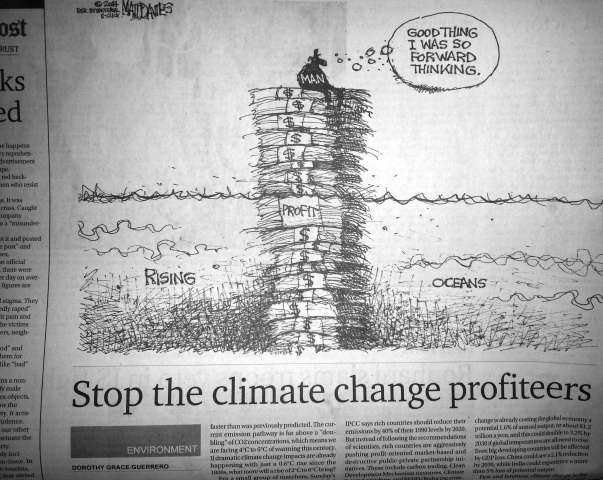United Nations Secretary-General Ban Ki-moon is hosting a Climate Summit in New York next week. Expected to attend are top officials from all UN Member States, big transnational corporations, financial institutions, and a few select civil society representatives. The goal is to build political will for a global agreement at the official negotiations in Paris in 2015 that would limit the world to a temperature rise of less than 2°C. But if prior UN climate events are any indication, the summit will be dominated by big corporations that have captured the climate negotiations and seek only to “green wash” their business-as-usual.
This Sunday, two days before the Climate Summit, around 100,000 participants will join the People’s Climate March and fill the streets of New York to press world leaders to act on climate change. About 1,500 simultaneous events will take place in cities around the world to complement what is supposed to be the biggest mobilisation to date on climate change. They aim to remind leaders that we are running out of time to save the planet from the climate crisis.
According to the Fifth Assessment Report of the Intergovernmental Panel on Climate Change (IPCC), climate change is advancing faster than was previously predicted. The current emission pathway is far above a “doubling” of CO2 concentrations, which means we are facing 4°C to 6°C of warming this century. If dramatic climate change impacts are already happening with just a 0.6°C rise since the 1800s, what more will a rise of 2°C to 6°C bring?
For a small group of marchers, Sunday’s mobilisation will highlight the need for a global movement for climate justice, and to expose what is not normally said in the polite premises of UN meetings: that big corporations hold too much sway over the negotiations, and are often to blame for insufficient action by governments. After two decades of summits and work done under the UN Framework Convention on Climate Change (UNFCCC), average global greenhouse emissions have continued to increase from just under half a gigatonne of CO2 per year between 1970 and 2000, to one gigatonne per year between 2000 and 2010.
The negotiations do not match the urgency of the situation. To maintain the average global temperature increase below 2°C by 2050, the IPCC says rich countries should reduce their emissions by 40% of their 1990 levels by 2020. But instead of following the recommendations of scientists, rich countries are aggressively pushing profit-oriented market-based and destructive public-private partnership initiatives. These include carbon trading, Clean Development Mechanism measures, Climate Smart Agriculture, and REDD (Reducing emissions from deforestation and forest degradation) schemes. These false solutions just delay or shift around the responsibility for reducing emissions. All indications show that what will come out of the Paris talks in 2015 will be very weak targets and voluntary pledges.
Climate change is affecting regions and social classes unequally. That is why the issue of justice is an important one to raise. The poorer countries and communities are experiencing the earliest and most severe problems. As a UN Development Programme report from 2007 says, global warming threatens most the poor and the unborn, the “two constituencies with little or no voice” in governance. Climate change is already costing the global economy a potential 1.6% of annual output, or about $1.2 trillion a year, and this could double to 3.2% by 2030 if global temperatures are allowed to rise. Even big developing countries will be affected by GDP loss. China could see a 2.1% reduction by 2030, while India could experience a more than 5% loss of potential output.
First and foremost, climate change is the result of an unjust economic system, and solutions to the crisis must address its root causes, something that can only come about with a change of the system. Shifting the way we approach development and governance requires a transformation in our politics and processes. This fact is asserted in a statement from Climate Space signed by over 340 movements and organisations representing millions of members worldwide.
It says: “Our most pressing challenge is the fact that big corporations are capturing the climate agenda to make new businesses designed to take advantage of the crises. In response, we need to send a message, loud and clear, to corporations: ‘Stop exploiting the tragedy of climate change!'”
Indeed, the climate talks are getting more and more in line with the corporate agenda of voluntary pledges and market-based “solutions” that will do more harm to the environment and the earth’s natural cycles. Will Ban Ki-moon’s Climate Summit save us from current climate politics?
Dorothy Grace Guerrero is a senior programme officer at Focus on the Global South, based in Bangkok.
Link to source: http://www.bangkokpost.com/opinion/opinion/433046/stop-the-climate-change-profiteers


![[Cambodia] Occupational Health and Safety for Construction Workers and Safe Building Standards Must Be Guaranteed](https://focusweb.org/wp-content/uploads/2019/07/Cambodia-Building-Collapse-440x264.jpg)





